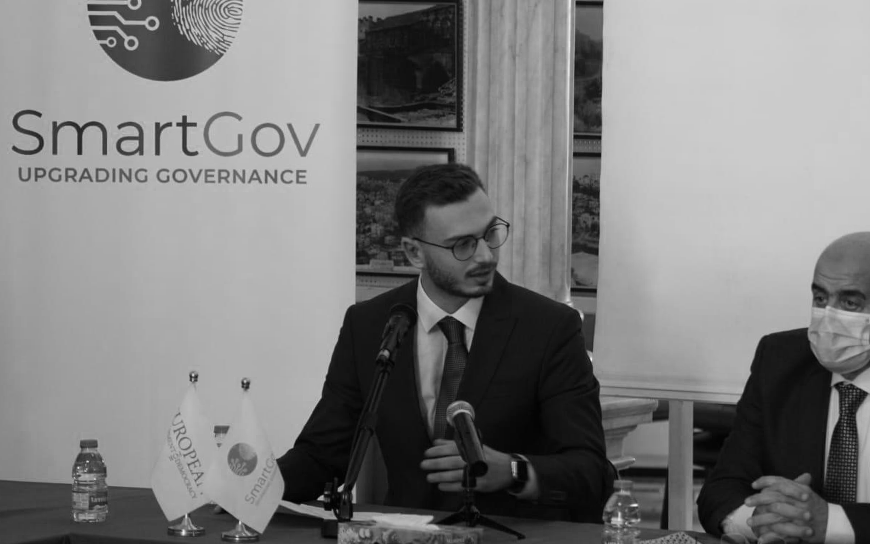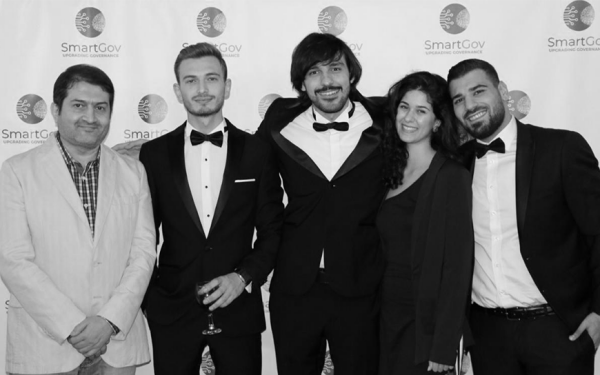
The founders of a technology-led NGO in the northern Lebanese city of Tripoli firmly believe that social and technological innovation go hand-in-hand. SmartGov is a start-up that is developing innovative e-governance tools so that citizens can have a greater say in local government.
This was a key demand of the hundreds of thousands of the mainly young protesters who took to the streets in October 2019 calling for radical political change and greater transparency and accountability of government. The fall-out from the catastrophic Beirut explosion of August 2020 and the deepening economic crisis in Lebanon have only made these demands even more urgent today.
Ihab Hallab, a social entrepreneur and activist, and one of the founders of SmartGov believes that e-governance is the best way to make sure this happens. Speaking to EED from SmartGov’s offices, he explains that the NGO is working closely with the municipal authorities in Tripoli and will shortly launch a new mobile app to provide a seamless dialogue between citizens and the authorities.
Technology as a way to eliminate corruption and improve transparency
As he explains it, “Technology offers new ways of eliminating corruption and improving transparency within government and ensuring civil engagement. Our solution digitalises all aspects of municipality operations, ensuring transparency and livestreaming expenses in real time.”
He emphasises that this app has been designed for ease of use. “Anyone with a phone or a PC and any experience of ever posting anything on social media can use it. Say as a citizen, you notice a problem on your street, you an upload a photo and pin it on a map. Then you can see in real-time when the municipality open your complaint and you can track their actions live on the app. In fact, all citizens can see pending events and events that have already been dealt with by local government.”
The app will also include e-forms, meaning that citizens can apply for services such as licences and certificates via the mobile app, thus enabling local authorities to reduce paperwork.

Tripoli municipality to launch project
The Tripoli municipality office are very much on-side. The mayor’s office has stated that this is an ‘absolutely necessary project’, at a time when so many citizens have lost confidence in the state and politics, and when it is vital to build bridges between local government and the community. SmartGov have already signed contracts with other municipalities.
SmartGov has worked hard to ensure that their solution fits the needs of local government, the community and above all that it is sustainable. Technological development is only a tiny part of what SmartGov do.
“If this project is to succeed it needs to take account of socio-political and socio-economic factors as well as institutional barriers to digitalisation. We carried out intensive research for this project, and we worked closely with civil society and public sector actors to determine their organisational needs and to match this with the best technological solution,” he explains.
A 360-degree approach to innovation
The co-founders’ diverse backgrounds have enabled them to take a 360-degree approach to technological innovation. Hallab has experience of working with more than 24 municipalities within Lebanon and he has a strong understanding of their operational needs and Ali Amhaz is a renowned organisational psychologist with a degree from the London School of Economics.
Hallab notes that the naming of the organisation was deliberate. “SmartGov can be broken down as follows: S, means personalised service delivery to citizens and civil society so that they can co-create with the government; M, implies using the latest mobile technologies; A, refers to relying on data analytics to drive policy and individualise communications; R, means ‘radically open’ or ensuring ultimate accountability and transparency; and T, means trustworthy, so our solutions are resilient and secure,” he explains.
Working locally first
Hallab notes that the plan is to roll-out SmartGov to local governments first, to build success stories and support, before beginning to work at a national government level. He also believes that the SmartGov technology has huge potential in other countries in the Middle East and the developing world.
One thing he is clear about is that SmartGov will remain an NGO, the only e-government focused NGO globally. “For me and my co-founders, this is an important cause. We believe that technology can revolutionise how countries are governed and this is why we are providing this as a free service to the government,” he says.
EED provided seed-funding to SmartGov enabling its launch in June 2020 and today the NGO is fully registered with a staff of 13. It has gathered an impressive advisory panel of experts and is now attracting considerable interest from other international organisations convinced by the viability and sustainability of this technology. Hallab is confident of the future. “The project is in safe hands,” he says.
This article reflects the views of the grantees featured and does not necessarily represent the official opinion of the EED.